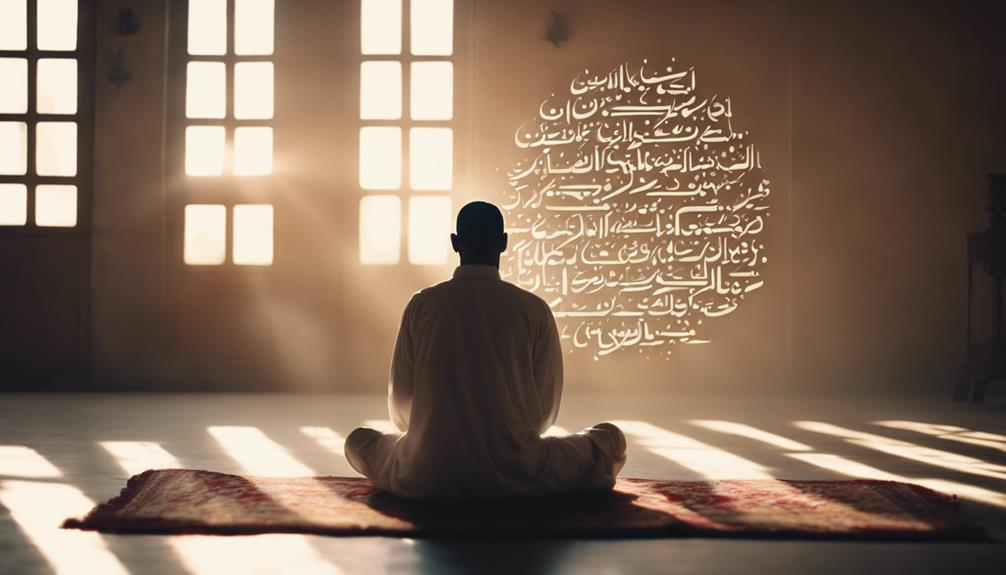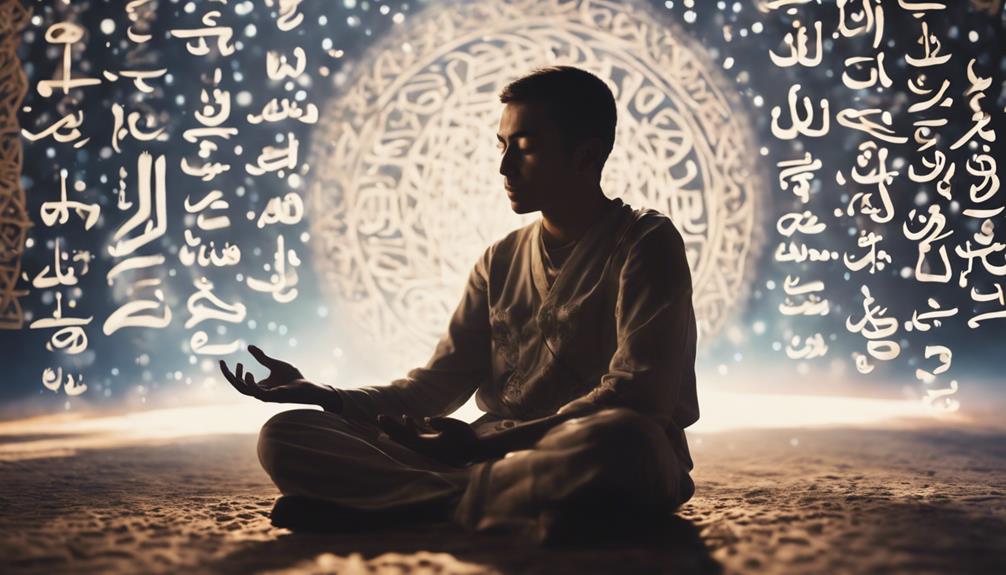Starting to master **Dhikr** means understanding its deep meaning. **Dhikr** helps spiritual growth, connecting people to Allah. **Tasbih** shows praise and thanks through precise counting. Saying **’SubhanAllah’** and **’Allahu Akbar’** honors Allah’s greatness. **Prayer beads** help with counting, boosting spiritual gain. **Dhikr** builds a spiritual bond, bringing peace and mindfulness. Saying it right makes it stronger, deepening the bond with Allah. Practicing it with dedication is key for growing spiritually. Doing **Dhikr** enhances the spiritual journey. Trying different ways can help master this amazing practice.
Key Takeaways
- Understand the meanings of common dhikr phrases like 'SubhanAllah' and 'Alhamdulillah'.
- Reflect on the significance of phrases to deepen spiritual connection.
- Learn the importance of accurate pronunciation for effective dhikr practice.
- Embrace sincerity in intentions to enhance the spiritual impact of dhikr.
- Explore diverse methods of counting and practice to master dhikr for beginners.
Importance of Dhikr
Understanding the significance of dhikr in Islam is essential for spiritual growth and connection to Allah. Dhikr, or the act of remembrance, holds immense importance in the teachings of Islam.
The Quran, in Surah al-Kahf (18), Ayah 24, emphasizes the significance of dhikr, highlighting its role in strengthening one's faith and fostering a deep connection with Allah. Additionally, the Prophet Muhammad himself elevated the status of those who engage in frequent remembrance of Allah, indicating the spiritual weight it carries.
Scholars and companions of the Prophet echoed this sentiment, stressing the continuous remembrance of Allah as vital for spiritual growth. Engaging in dhikr isn't merely a ritual; it's a powerful act that brings believers closer to Allah, paving the way for prosperity and success in both the worldly life and the hereafter.
Neglecting dhikr, on the other hand, can lead to loss and regret, as prioritizing the remembrance of Allah acts as a shield against spiritual and material setbacks.
Significance of Tasbih

Tasbih plays a vital role in our remembrance of Allah, serving as a way to express our praise and gratitude.
The counting method used during Tasbih, whether through prayer beads or fingers, helps us maintain accuracy and focus.
Tasbih in Dhikr
In the practice of dhikr, the significance of Tasbih lies in its essence as a means of glorifying and praising Allah through the repetition of specific phrases or prayers. Tasbih involves the remembrance of Allah by reciting phrases like 'SubhanAllah' (Glory be to Allah) repeatedly. It serves as a key component in Islamic worship, emphasizing the exaltation and magnification of Allah.
The Tasbih of Fatima, recommended by Imam Sadiq, holds special merit and rewards in Islamic tradition. To maintain accuracy and focus during Tasbih recitation, many individuals use prayer beads or counting methods. These tools aid in the meticulous repetition of phrases, allowing for a deeper connection with the divine through the act of remembrance.
Tasbih Counting Method
Repetition of specific phrases a set number of times is a fundamental aspect of the Tasbih counting method in Dhikr practice, serving as a means of remembrance of Allah. Commonly used phrases like 'SubhanAllah,' 'Alhamdulillah,' and 'Allahu Akbar' are recited to deepen spiritual connection. Different methods, such as counting on fingers or using prayer beads, aid in maintaining accurate counts. The Tasbih of Fatima, recommended for daily recitation after prayers, enhances spiritual rewards. Engaging in Tasbih counting helps beginners in Dhikr mastery by providing a structured approach to remembrance. Below is a table illustrating the significance of Tasbih counting:
| Tasbih Counting Method | Importance |
|---|---|
| Structured Practice | Aids in spiritual connection |
| Focus and Concentration | Enhances mindfulness |
| Rewarding Experience | Increases spiritual rewards |
Tasbih Benefits
After exploring the structured practice and rewarding experience of Tasbih counting in Dhikr mastery, understanding the significance of Tasbih benefits sheds light on the spiritual rewards and practices associated with this form of remembrance.
Reciting the Tasbih of Fatima daily after prayers is more pleasing to God than 1000 rakats of prayer. Using prayer beads made from specific materials can bring rewards when reciting the Tasbih of Fatima. Supplicating with clay from Imam Hussain's grave can result in numerous rewards for believers. Various schools of thought within Islam accept the use of prayer beads for Tasbih recitation.
While some consider the use of prayer beads for Tasbih an innovation, it's widely practiced and accepted by many Muslims. Remembering Allah through Dhikr is considered one of the best of deeds.
Understanding Dhikr Phrases

Exploring the meanings behind various dhikr phrases enriches our spiritual practice and deepens our connection to Allah. Dhikr phrases are powerful tools for remembrance and praise of Allah.
For instance, when we say 'SubhanAllah,' we're declaring the glory of Allah. 'Alhamdulillah' expresses gratitude and praise towards Allah, while 'Allahu Akbar' acknowledges that Allah is the Greatest.
Understanding the meanings of these phrases goes beyond mere recitation; it allows us to reflect on the attributes of Allah and internalize their significance in our lives.
Methods of Counting Dhikr

Utilizing prayer beads, counting lines on fingers, or employing a tally counter are common methods for counting dhikr during spiritual practice. Some dhikr phrases have specific numbers of repetitions, like saying 'SubhanAllah' 33 times or 'Allahu Akbar' 34 times. Counting lines on each finger can aid in accuracy when reciting dhikr. Different dhikr practices may involve repeating phrases a certain number of times on each hand to reach the desired total count. Following a systematic approach to counting guarantees the correct recitation of dhikr and helps in maintaining focus during the remembrance of Allah.
It's important to choose a method that resonates with you personally to make the counting process smoother. Whether it's the tactile sensation of prayer beads, the visual aid of finger lines, or the simplicity of a tally counter, finding what works best for you can enhance your spiritual practice. Remember, the goal isn't just to count the dhikr but to immerse yourself in the remembrance of Allah with sincerity and focus.
Establishing Spiritual Connection

To establish a strong spiritual connection through dhikr, beginners must prioritize the remembrance and glorification of Allah. Engaging in meaningful dhikr practices allows individuals to deepen their bond with the Divine. By understanding the significance of dhikr, beginners can lay a solid foundation for their spiritual journey. Here is a table to help you grasp the importance of spiritual connection through dhikr:
| Dhikr Benefits | Description |
|---|---|
| Spiritual Fulfillment | Dhikr provides a sense of inner peace and contentment, fostering a deep spiritual connection. |
| Increased Awareness | Engaging in dhikr helps individuals become more mindful of Allah's presence in their lives. |
| Strengthened Faith | Regular dhikr strengthens one's faith and belief in the Divine, nurturing a spiritual bond. |
| Emotional Stability | Dhikr practices contribute to emotional resilience, aiding in maintaining a balanced state. |
Benefits of Dhikr Practice

Engaging in dhikr practice offers individuals a path to spiritual enlightenment and a deeper connection with Allah. Through regular remembrance (dhikr), our hearts find peace, faith is strengthened, and we can detach from worldly distractions.
Dhikr purifies the heart, seeking guidance and strengthening the bond with Allah. The essence of dhikr lies in achieving mindfulness and remembering Allah in all actions. By engaging in dhikr, we aim to find inner peace, experience spiritual growth, and deepen our understanding of faith.
This practice not only brings us closer to Allah but also helps us navigate life's challenges with a sense of calm and purpose. It's through the repetition of Allah's name and remembrance that we find solace, strength, and a profound connection to the divine.
Embracing dhikr allows us to cultivate a state of tranquility and closeness to Allah that permeates every aspect of our being.
Accuracy in Dhikr Recitation

Pronouncing each word accurately is essential for maintaining precision in Dhikr recitation. When engaging in the remembrance of Allah through Dhikr, accurate pronunciation is key to ensuring the intended meaning is conveyed. Proper articulation and enunciation not only demonstrate respect for the sacred words but also enhance the spiritual impact of the practice. Consistent and accurate recitation of Dhikr leads to a deeper connection with Allah, fostering mindfulness and devotion in worship.
To help you focus on accuracy in Dhikr recitation, here is a helpful table outlining the importance of precise pronunciation:
| Importance of Accurate Pronunciation in Dhikr |
|---|
| Conveys intended meaning effectively |
| Enhances spiritual impact of Dhikr |
| Deepens connection with Allah |
| Fosters mindfulness and devotion in worship |
Sincerity in Dhikr Practice

Maintaining sincerity in dhikr practice entails wholehearted devotion and a focused commitment to remembering Allah. When engaging in remembrance (dhikr), it's important to cultivate sincerity in our intentions to seek closeness to the divine. Here are key points to ponder:
- Purity of Intention: Make sure that your intentions are solely directed towards pleasing Allah and seeking His presence through dhikr. This sincerity will enhance the effectiveness of your practice.
- Seeking Spiritual Growth: Genuine dhikr not only purifies the heart but also leads to inner peace, spiritual growth, and a profound connection with the divine. It's a pathway to strengthening faith and mindfulness.
- Role of Intention: The intention behind your dhikr practice is pivotal. It shapes the quality of your remembrance and determines its acceptance. Approach dhikr with a pure heart and a sincere desire to draw closer to Allah.
Deepening Spiritual Experience

To deepen our spiritual experience through dhikr, we must wholeheartedly immerse ourselves in mindful remembrance of Allah. Engaging in the remembrance of Allah (dhikr) allows us to strengthen our spiritual connection and experience inner peace. By focusing on the profound meaning and significance of dhikr, beginners can cultivate a deeper sense of presence and mindfulness in their worship. Understanding the essence of dhikr helps us to incorporate it into our daily routines for spiritual growth and guidance.
Through the practice of mindful remembrance, beginners can enhance their spiritual experience and establish a closer bond with Allah. Dhikr mastery for beginners involves not only reciting words but also internalizing their meaning and reflecting on the teachings they hold. By immersing ourselves in dhikr with sincerity and devotion, we pave the way for a more profound spiritual journey filled with tranquility and enlightenment. Remembering Allah through dhikr is a powerful tool for beginners seeking to deepen their spiritual connection and experience the beauty of mindful remembrance.
Mastery of Dhikr for Beginners

Let's now explore how beginners can elevate their spiritual practice by mastering the art of dhikr. Delving into the domain of dhikr can lead one closer to the divine and enrich their spiritual journey. Here are three key steps to help beginners on their path to dhikr mastery:
- Understanding the Essence: Begin by grasping the profound significance of remembrance (dhikr). Recognize that those who engage in dhikr are the people of Paradise, as the Prophet Muhammad (peace be upon him) said, 'The people of Paradise won't regret except one thing: the hour that passed them by and in which they made no remembrance of Allah.'
- Practicing with Purpose: Start incorporating common phrases and practices of dhikr into your daily routine. By doing so, you can strengthen your connection with Allah and cultivate mindfulness in your actions.
- Exploring Diverse Methods: Experiment with various types and techniques of dhikr to find what resonates most with your soul. Seek guidance from scholars and persist in your practice to experience the transformative power of remembrance.
Embark on this journey of dhikr mastery with dedication and an open heart, and witness the profound impact it can have on your spiritual growth.
Frequently Asked Questions
What Are the Three Types of Dhikr?
The three types of dhikr are heart dhikr, tongue dhikr, and combined heart-tongue dhikr.
Heart dhikr involves remembering Allah inwardly with sincerity and focus.
Tongue dhikr includes verbalizing phrases like 'SubhanAllah' and 'Alhamdulillah.'
Combined heart-tongue dhikr integrates both inward remembrance and outward verbalization for a thorough practice.
Practicing all three types guarantees a holistic approach to effectively remembering Allah.
What Is the Literal Meaning of Dhikr?
The literal meaning of dhikr, in Arabic, is remembrance or mention. It involves recalling and acknowledging the greatness, attributes, and blessings of Allah.
Understanding this highlights the central role of remembering and glorifying Allah in Islamic devotion. Dhikr encompasses various forms of worship centered on remembering Allah. This practice emphasizes spiritual connection and gratitude.
Mastering dhikr involves embracing its significance in all actions for spiritual growth and closeness to Allah.
The Supplication for Learning and Understanding Is: "Allahumma Infa'nii Bimaa 'Allamtanii Wa'allimnii Maa Yanfa'uunii. O Allah! Benefit Me With What You Have Taught Me, and Teach Me What Will Benefit Me."
The supplication 'Allahumma Infa'nii Bimaa 'Allamtanii Wa'allimnii Maa Yanfa'uunii' seeks benefit in teachings and understanding what's beneficial. It's a prayer to Allah for help in comprehending and applying acquired knowledge.
By reciting it, believers aim to utilize knowledge for their betterment. Understanding this supplication is important for beginners on their path of learning and spiritual growth through dhikr.
It emphasizes seeking knowledge that brings positive outcomes and guidance in its application.
What Are the Stages of Dhikr?
The stages of dhikr involve initiation, concentration, contemplation, absorption, and culmination. Initiation marks the beginning, setting intention.
Concentration maintains mindfulness, avoiding distractions.
Contemplation reflects on meanings, deepening connection.
Absorption leads to immersion in dhikr, engaging heart and mind fully.
Culmination brings a sense of fulfillment and spiritual growth.
Mastering these stages requires dedication and practice.
Understanding each phase enhances the journey towards a deeper connection with Allah.
Can Dhikr Mastery Help in Understanding the Meaning of Moon Cricket?
Dhikr mastery can deepen spiritual understanding, but it may not directly relate to the meaning of moon cricket. The term “moon cricket” has historical derogatory connotations, and it’s important to approach it with sensitivity and awareness of its harmful implications.
Conclusion
In mastering dhikr, beginners can deepen their spiritual connection through understanding the significance of tasbih and reciting phrases with accuracy and sincerity. By incorporating methods of counting and establishing a regular practice, one can experience a profound spiritual journey.
Remember, repetition and reflection are key to achieving mastery in dhikr. So, let's commence on this enlightening journey of dhikr mastery together, to reveal the true power of spiritual connection and growth.










